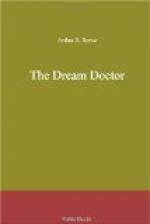By what stretch of imagination he could call that recreation, I could not see. But as for quietness, I needed it, too. I had fallen wofully behind in my record of the startling events through which he was conducting me. Consequently, until late that night I pecked away at my typewriter trying to get order out of the chaos of my hastily scribbled notes. Under ordinary circumstances, I remembered, the morrow would have been my day of rest on the Star. I had gone far enough with Kennedy to realise that on this assignment there was no such thing as rest.
“District Attorney Carton wants to see me immediately at the Criminal Courts Building, Walter,” announced Kennedy, early the following morning.
Clothed, and as much in my right mind as possible after the arduous literary labours of the night before, I needed no urging, for Carton was an old friend of all the newspaper men. I joined Craig quickly in a hasty ride down-town in the rush hour.
On the table before the square-jawed, close-cropped, fighting prosecutor, whom I knew already after many a long and hard-fought campaign both before and after election, lay a little package which had evidently come to him in the morning’s mail by parcel-post.
“What do you suppose is in that, Kennedy?” he asked, tapping it gingerly. “I haven’t opened it yet, but I think it’s a bomb. Wait--I’ll have a pail of water sent in here so that you can open it, if you will. You understand such things.”
“No—no,” hastened Kennedy, “that’s exactly the wrong thing to do. Some of these modern chemical bombs are set off in precisely that way. No. Let me dissect the thing carefully. I think you may be right. It does look as if it might be an infernal machine. You see the evident disguise of the roughly written address?”
Carton nodded, for it was that that had excited his suspicion in the first place. Meanwhile, Kennedy, without further ceremony, began carefully to remove the wrapper of brown Manila paper, preserving everything as he did so. Carton and I instinctively backed away. Inside, Craig had disclosed an oblong wooden box.
“I realise that opening a bomb is dangerous business,” he pursued slowly, engrossed in his work and almost oblivious to us, “but I think I can take a chance safely with this fellow. The dangerous part is what might be called drawing the fangs. No bombs are exactly safe toys to have around until they are wholly destroyed, and before you can say you have destroyed one, it is rather a ticklish business to take out the dangerous element.”
He had removed the cover in the deftest manner without friction, and seemingly without disturbing the contents in the least. I do not pretend to know how he did it; but the proof was that we could see him still working from our end of the room.
On the inside of the cover was roughly drawn a skull and cross-bones, showing that the miscreant who sent the thing had at least a sort of grim humour. For, where the teeth should have been in the skull were innumerable match-heads. Kennedy picked them out with as much sang-froid as if he were not playing jackstraws with life and death.




